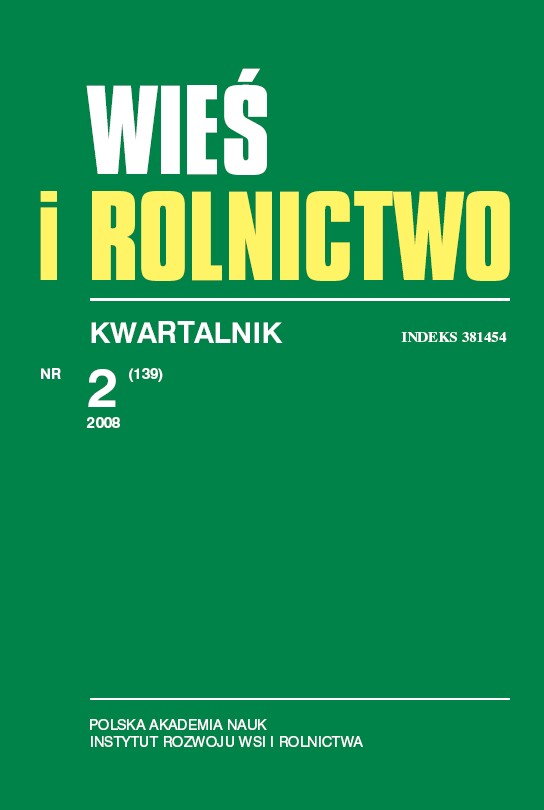Predicted Effects of the Imposition of an Income Tax on Farms
DOI:
https://doi.org/10.53098/wir.2008.2.139/11Keywords:
income tax, agricultural tax, individual farms, communal budget, state budgetAbstract
The paper describes the predicted effects for communal budgets of the introduction of an income tax for farms which would replace the present agricultural tax. Research conducted in the farms located in the Wielkopolska, Śląsk, Mazowsze and Podlasie regions, which participated in the FADN system, has indicated that the imposition of an income tax meant as the source of incomes of communes would be very beneficial for their budgets. The advantages would be far greater in the Mazowsze and Podlasie regions. If it is accepted that communal budgets will have the same share in the income tax paid by farms as in the income tax paid by natural persons (39.34%) then, on the whole, this solution would not be beneficial for them. This situation generally relates to the Wielkopolska and Śląsk regions because in the latter region the inflow of means from communal budgets was higher than the inflow of cash from the agricultural tax. Their earning power situation would be even more unfavourable if it was accepted that the proposed income tax should be equal to the corporate income tax (6.71%). The introduction of an income tax for farms would be advantageous to the state budget. In individual communes the advantages (or their absence) of the introduction of the income tax depend on the number of operating farms, their acreage, type of farming and the adopted rules of the communes participation in incomes from this tax. For the farms that are not engaged in the production of goods for the market the introduction of a flat tax would be more suitable.References
Gomułowicz A., Małecki J., 2006: Podatki i prawo podatkowe. Wydawnictwo Prawnicze LexisNexis, Warszawa.
Gruziel K., 2006: Opodatkowanie rolnictwa w ocenie rolników indywidualnych. Roczniki Naukowe SERiA, VIII, 4.
Karpus K., 2002: Systemy podatków lokalnych w wybranych państwach europejskich. Wydawnictwo Adam Marszałek, Toruń.
Kuzińska H., 2001: Finanse publiczne. Wydawnictwo Wyższej Szkoły Przedsiębiorczości i Zarządzania im. Leona Koźmińskiego, Warszawa.
Majchrzycka-Guzowska A., 1999: Finanse i prawo finansowe. Wydawnictwa Prawnicze PWN, Warszawa.
Mastalski R., 2006: Prawo podatkowe. Wydawnictwo C.H. Beck, Warszawa.
Modzelewski W., 2007: Wstęp do nauki polskiego prawa podatkowego. Wydawnictwo Instytutu Studiów Podatkowych, Warszawa.
Owsiak S., 2000: Finanse publiczne. Teoria i praktyka. Wydawnictwo Naukowe PWN, Warszawa.
Podstawka M., 1995: Opodatkowanie rolnictwa i perspektywy jego zmian w Polsce. Wydawnictwo SGGW, Warszawa.
Podstawka M., 2000: System podatkowy w rolnictwie. Wydawnictwo SGGW, Warszawa.
Szczodrowski G., 2003: Polski system podatkowy. Strategia transformacji. Wydawnictwo Uniwersytetu Gdańskiego, Gdańsk.
Ustawa o podatku rolnym z dnia 15 listopada 1984 roku, tekst jednolity. Dz. U. z 2006 r., nr 136, poz. 969.
Wach K., 2005: Systemy podatkowe krajów Unii Europejskiej. Oficyna Ekonomiczna, Kraków.
Wasilewski M., Gruziel K., 2007: Podatek dochodowy w opiniach rolników. Zagadnienia Ekonomiki Rolnej 2.
Wilkinson M., 1992: Taxation. Macmillan, London. DOI: https://doi.org/10.1007/978-1-349-21989-6
Downloads
Article file downloads
Pages
How to Cite
Issue
Section
License
Copyright (c) 2008 Wieś i Rolnictwo

This work is licensed under a Creative Commons Attribution 4.0 International License.










